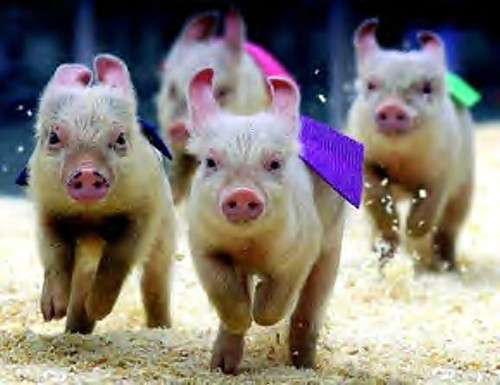
The Charge of the Light MRSA Brigade
A few months ago, I discussed an article that demonstrated that pigs had ridiculously high frequencies of MRSA. ScienceBlogling Revere discusses another paper about pigs and MRSA. Like the previous study (published by some of the same authors), several of the same conclusions can be drawn:
- These are astronomical rates of MRSA, relative to anything outside of a clinical setting--and the Netherlands' MRSA frequency is an order of magnitude lower than the U.S.
- One piece of evidence argues for the hypothesis that the use of antibiotics in agriculture, either beta-lactams (the case of antibiotics to which methicillin belongs): different methicillin gene cassettes have shown up in the same genetic background of MRSA. This suggests that selection is a major factor in the high frequencies of MRSA in piggies.
- On the other hand, this can't be the whole story. Based on the genetic data, this MRSA strain is sweeping through the pig population. This suggests that there are ecological factors other than selection of antibiotic resistance going on here. I've noted before that 'epidemics' of commensals are quite common. I think the same thing is happening here; this strain seems to be sweeping through pigs asymptomically because the strain is adapted to pigs, or what we could call 'piggy.' (An aside: the pigs aren't getting sick, so MRSA is a commensal in pigs--not to mention in the roughly 1.5% of people in the U.S. who carry MRSA without any symptoms).
- In the clinical setting, high frequencies of MRSA are not solely due to a genetic shift in the frequency of resistance, but primarily due to an absolute increase in the number of infections. The reason I bring this up is because this doesn't appear to be the case in pigs. In pigs, this appears to be a replacement of methicillin-sensitive staph with MRSA (although I could be wrong about this). I'm not sure yet what this means, but it's worth thinking about (and verifying).
This new paper is very interesting. And disturbing.

Did you see the Canada one in Veterinary Microbiology? That's even scarier for us in the US, since as far as imported pigs go, Canada is our largest supplier...so we're potentially seeding farms all over the US with MRSA-carrying swine.
Hell, had a few minutes and since you and Revere covered the Netherlands angles, I wrote up the Canadian study.
What's even scarier is that resistant bacterial in farm soil can invade and inhabit farm plants. Once they get inside, they cannot be killed without killing the plant.
thanks